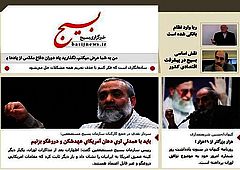Basij and the IRGC Respond Cautiously
» The Impact of the Lausanne Agreement in Iran
The Lausanne agreement continues to lead the news. Neither Javad Zarif’s presence in the Majlis not a challenging television interview have succeeded in satisfying the opponents of the deal in Iran. Still, it appears that a group of critics look at the recent nuclear agreement – which pro-government elements have heralded as a historic victory - very cautiously. For example, a website run by individuals who were part of Iran’s nuclear talks during Mahmoud Ahmadinejad’s administration only published a commentary by its editor which had been published earlier in Vatan Emrouz newspaper. Paramilitary Basij force commander general Naghdi echoed the government’s line of pressuring the United States to fulfill what it called its obligations.
Advisor to the Top IRGC Commander: Monitor, Do not Oppose
Hossein Shariatmadari remains the sharpest and most open critic of the nuclear arrangement reached in Lausanne, Switzerland. He expressed his views even before the newspaper he oversees – Kayhan - published his views. Commentary in Kayhan newspaper was essentially about Iran having been duped in the talks. Shariatmadari’s own editorial was a little less harsh. It called the country’s negotiating team “Children of Islam, the revolution and defenders of national interest.” But it also asks the government of Hassan Rouhani not to over praise Lausanne agreement so that it can be properly and freely analyzed. “What is wrong with modifying an agreement that is not in line with the national interest – and the Lausanne agreement is precisely this,” he wrote.
Hamid Rasai, a staunch critic of Rouhani’s administration and an opponent of the nuclear agreement held a televised debate with pragmatic and pro-government university professor Sadegh Zibakalam and ridiculed the ‘win-win’ argument of the talks. He said people would remember this event in the future and using a 19th century agreement that Iran had signed with Russia which is remember to have been a sellout, implied that the agreement would be viewed to be contrary to the interests of the country.
IRGC’s Javan newspaper has a different concern: that the image of the United States will become positive and continues to advocate that there should be no optimism about the “hegemon order,” a reference to the United States. It republishes the words of ayatollah Khamenei that “the enemy is opposed to the essence of the revolution and sanctions would not be lifted even if the imposed conditions on the nuclear issue are accepted.”
The former managing director of Fars News Agency – owned by the IRGC – who is now the advisor to the top IRGC commander is also a critic of the agreement. But like other military figures avoids openly criticizing Rouhani’s administration. Hamid-Reza Moghadamfar rejects any trust in the “assertions of American officials” while also rejecting the negations that are made regarding the “remarks of our own team.” He rejects those who say the Lausanne statement is a betrayal to the Islamic regime and the Iranian people. His praise of course goes to the “guidance provided by the supreme leader and the resistance of the government and people.”
General MohammadReza Naghdi, the top commander of the Basij paramilitary force – a known detractor of the nuclear talks – has called for cooperation between the government and its critics, while true to form harshly criticizing the US. According to him, the talks once again proved that American officials are untruthful and untrustworthy. He said, “The best help that people can provide to the government today to lift the sanctions, is exposure of the deceitful face of America in the country and the region.”
Ironically, he also believes that lifting the sanctions will not have any effect on Iran’s economy!



